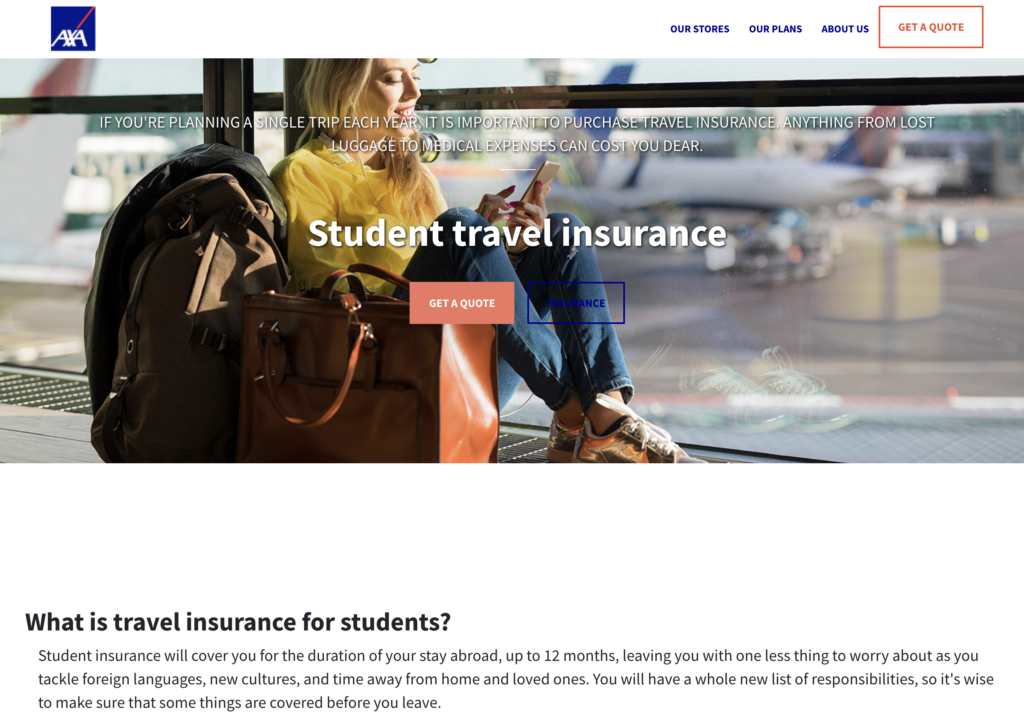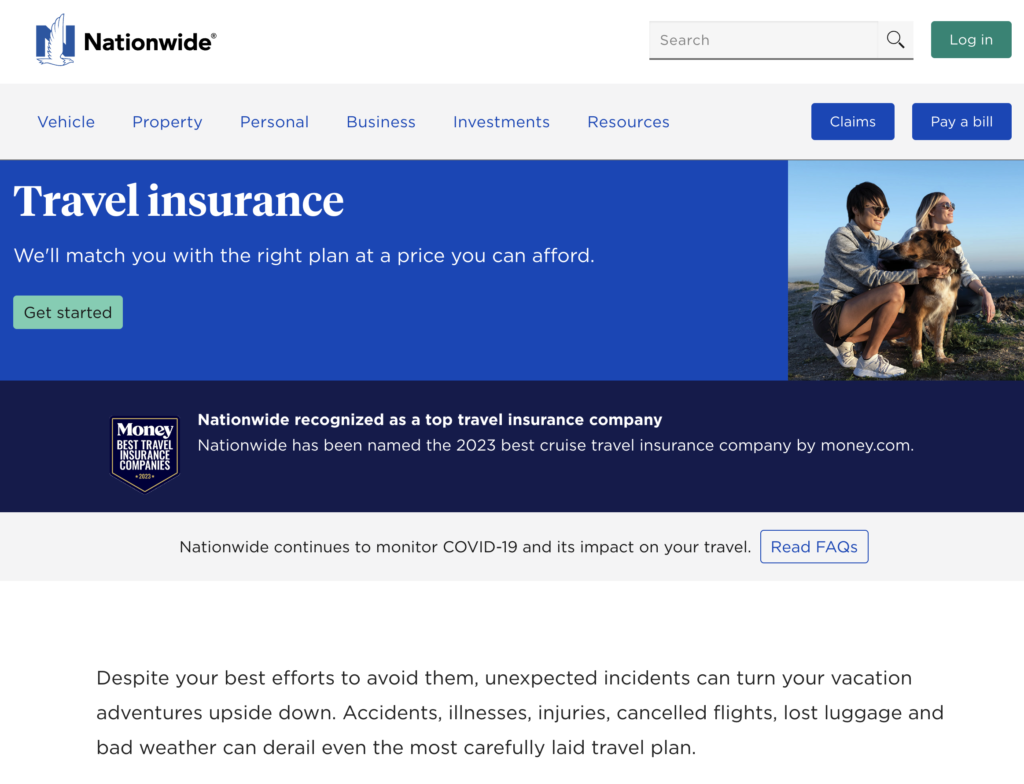Best Student Travel Insurance for Europe
Here at BTS we help plenty of students find their ideal programs for full degrees in Europe every year. Studying in Europe can be a fantastic and life changing experience for students. This experience has so many benefits, allowing students to fully immerse themselves in different cultures, languages, and challenge themselves academically. However, in the excitement of planning for such an adventure, it’s important not to overlook the importance of securing appropriate insurance coverage. From health emergencies to travel delays and complications, having the right insurance can provide many student travelers a relaxed mind and financial protection. We will also go through some of the different types of healthcare providers that students will have access to during their degree program in Europe.
For US students heading to Europe, here’s BTS’ guide to navigating insurance options
Our Top Picks for Travel Insurance
Allianz Insurance

Allianz travel insurance has a generous medical policy, and unlike many competitors, has an option that you can select to include additional coverage for both hospital and dental visits. Allianz also offers packages that cover pre existing medical conditions which can be very good for students that may need this. We like Allianz for its flexibility and wide range of add ons.
Allianz Global Assistance is Jaimee’s top pick (and what she uses herself!), offering customizable plans with options for trip cancellation, emergency medical assistance, and baggage protection.
Allianz has a 4.2 Rating on Trust Pilot
Details of Allianz Travel Insurance for Students
Pros
Cons
Bottom Line
Allianz travel insurance offers robust coverage options and global support, making it a strong choice for students traveling or studying abroad. However, the higher cost and complex policy terms may require careful consideration and comparison with other providers to ensure it meets individual needs and budgets.
AXA Travel Insurance

AXA is a well-known multinational insurance company that offers various types of insurance products, including travel insurance. AXA’s travel insurance typically provides coverage for unforeseen events that may occur before or during your trip, offering financial protection and assistance when you’re away from home. AXA also offers optional coverage add-ons, such as rental car coverage, adventure sports coverage, or coverage for pre-existing medical conditions.
Axa has a 4.0 Rating on Trust Pilot
Pros
Cons
Bottom Line
AXA Travel Insurance offers a range of benefits for students, including comprehensive coverage, 24/7 assistance, and a global network of providers. However, it’s important to consider the cost, potential exclusions, and the complexity of the policy. Students should carefully review the terms and conditions, compare different plans, and consider their specific travel needs to determine if AXA Travel Insurance is the right choice for them.
It’s important to carefully review the terms and conditions of any travel insurance policy, including those offered by AXA, to understand what is covered and any limitations or exclusions that may apply. Additionally, coverage options and availability may vary depending on your location and the specific AXA travel insurance product you choose.
Nationwide Student Travel Insurance

Nationwide’s student travel insurance plans typically include coverage for trip cancellation/interruption, emergency medical expenses, emergency medical evacuation, baggage loss/delay, and other travel-related risks. Customers can choose from different levels of coverage and options to tailor the travel insurance plan up to their specific needs and budget.
Nationwide offers travel assistance at no additional cost with all its plans. The only negative would be the lack of flexibility as they don’t have as many add ons as some of their competitors.
Nationwide has a 3.5 Rating on Trust Pilot
Pros
Cons
Bottom Line
Nationwide Student Travel Insurance offers a comprehensive solution for students embarking on getting their degree abroad. They offer extensive coverage options including medical expenses, trip interruptions, and baggage protection. The 24/7 travel assistance ensures support is available at any time, anywhere in the world. However, the cost can be higher compared to other providers, and there are very important exclusions plus limitations to be aware of. Overall, Nationwide is a strong choice for those seeking reliable and thorough coverage for their academic travels.
Seven Corners

For alot of students, price is usually be a main factor when selecting an insurance plan. Travelex is Our pick for families for affordable student travel insurance thanks to its low rates. It offers two policies — the Travel Select and Travel Basic plans. Travel Basic plans include limited coverage but can provide peace of mind for students traveling on a budget. The company offers a diverse portfolio of travel insurance products, including international travel medical insurance, trip cancellation/interruption insurance, student insurance, group travel insurance, and more. Seven Corners’ plans typically provide coverage for medical expenses, with emergency medical evacuation coverage, trip cancellation/interruption, baggage loss/delay, and other travel-related risks.
Selecting a plan with Seven Corners also includes access to the company’s 24-hour assistance services, a hotline you can call for help with a variety of travel-related issues, such as medical emergencies and lost passports.
Seven Corners has a 4.2 Rating on Trust Pilot
Pros
Cons
Bottom Line
Seven Corners Student Travel Insurance provides practical coverage for students studying abroad or traveling for educational purposes. The plan includes emergency medical coverage, trip interruption reimbursement, lost baggage protection, and 24/7 travel assistance. With Seven Corners, students can concentrate on their studies and experiences, knowing they have support for unexpected expenses and emergencies.
What does travel insurance for students cover?
For many students who about to embark on their degree abroad adventure, it may be the first time that they need to purchase their own insurance plan. This can be a bit overwhelming if you are not sure what to look for or where to start. There are many things to consider when looking for a suitable insurance for you. This can depend on your age, budget, and other pre existing medical conditions that you might have.
What should your travel insurance cover:
Trip Cancellation Protection
This coverage will reimburse you for any prepaid, nonrefundable costs of your trip like flights, hotels, etc. should you have to cancel for any unexpected circumstances. Post COVID-19 , many travel insurance companies have also added add-ons for any cancellations due to the virus so its good to check if your provider will offer additional coverage for this.
Trip cancellation protection insurance is very useful as you never know what unexpected event may come up that will cause you to cancel your trip. Having this kind of travel protection, will give you some peace of mind in knowing that you will be protected financially in case of any unforseen things.
Travel medical coverage
If you become sick or suffer from an injury while studying abroad, travel medical coverage can help pay for medical expenses and even emergency repatriation back home. This type of coverage is designed to help travellers with unexpected medical emergencies or illnesses that may occur during their trip outside of their home country.
This type of medical coverage is very important as you don’t want to be stuck with large hospital bills for any unexpected illness. We suggest to look for travel medical expense coverage or a plan that covers flights or medical transport back to your home country if more extensive medical care is needed as this service can be quite costly without an insurance plan.
Travel delay insurance
Travel delay insurance is a part of travel insurance policies that provides coverage for unexpected delays during your journey. These delays can occur due to various reasons, such as flight cancellations, missed connections, severe weather, pandemics, strikes, or other force majeure circumstances that may disrupt your travel plans.
Travel delay insurance can provide peace of mind and financial protection when unexpected delays occur during your travels, helping to mitigate the inconvenience and additional expenses associated with such disruptions.
Delayed or Lost Luggage
Delayed or lost luggage is a common occurrence during travel and can be a source of frustration and inconvenience for travellers. If this has happened to you, you would know the imporatance of selecting a plan which covers unforeseen expenses due to lost or delayed baggage.
There can be several terms and conditions as to what they insurance may cover. In some cases they will only cover expenses after a certain time period (like 12 hours or more, for example) Therefore we strongly suggest to review the terms and conditions carefully.
National Health Insurance
In some countries, travel health insurance will not be enough and you will be required to take out a local plan with a provider in the country where you will be studying. This is especially important if you will be taking up a part time job to support yourself in your studies. National health insurance often provides access to a network of healthcare providers, including general practitioners, specialists, hospitals, and clinics, ensuring that students can receive timely and quality healthcare services when needed. This comprehensive network helps students address both routine medical needs and unexpected emergencies, allowing them to focus on their studies without worrying about their health.
Accessing national health insurance in Europe as a student typically depends on your specific situation. Your College or University’s international student office or administration department can provide specific guidance on health insurance requirements and options available to students enrolled in their programs.
Generally, to be able to access National health insurance you will need to have a bank account and an address in the country of study. Therefore, you will need to apply for this once you arrive in the country of Study. Once again, your school will be able to help you with this – they work with many international students and are very familiar with the process.
Healthcare Systems in Europe
Europe has an excellent healthcare system. The structure and the services offered can differ from one country to another. Many European countries have public healthcare systems funded through taxes, offering low-cost or free medical treatment to residents and visitors alike. Similar to the US, European Countries have different types of Healthcare providers, lets go through the basics below:
Public and Private Healthcare Providers:
International students abroad can choose between private and public healthcare according to their preferences and requirements. Public healthcare systems in Europe are usually funded by the government and would be free or inexpensive to access.
Public Healthcare Hospitals typically have much longer waiting times for non emergencies than private healthcare options would.
Universal Healthcare:
The European healthcare system varies from country to country but generally follows a universal healthcare model, providing essential medical services to all residents. Many European countries have public healthcare systems funded through taxes, offering low-cost or free medical treatment to residents and visitors alike.
You can visit the study in… websites for the countries you are considering studying in to see if you would be able to qualify for universal healthcare in your country of choice.
Primary Care :
In Europe, you will find centres called “Primary Care” healthcare facilities. These primary care facilities are typically by appointment only and can see you for day to day, non urgent medical including sexual and mental health, and in some cases they also help with fractures, broken bones and more. In some non – urgent cases, it’s good to give them a call to see if they might be able to help you before going to a private hospital to avoid long waiting times.
In order to find more information on how to access healthcare in Europe, you can check online directories where you can search for healthcare providers based on location, specialty, and other criteria.
Who needs Travel Insurance?
Non European Citizens
For non-EU/EEA students traveling to Europe for study purposes only, a travel health insurance plan might be enough for your stay. If you are already have private insurance in the US, check with you or your parents’ insurance provider that your policy covers you in your destination country.
Before embarking on a European study adventure, American students should really consider all possible problems that may arise and select the best option for them. Having a policy with a high level of coverage can help students face unexpected expenses and emergencies, permitting them to focus on their studies and cultural experiences with peace of mind. By researching reputable insurance providers and selecting appropriate policies, students can enjoy their time of study abroad, while staying protected both financially and medically.
Our members only Facebook community group is a great way to interact with other American families who have gone through this process before and they often share their experiences with purchasing private travel/health insurance and going through the National health insurance route. Sign up today and be a part of our community!
If your health insurance is not recognised there, you may need to take out a national health insurance plan in the country where you are studying. You might also need to buy national health insurance if you have a permanent or long-term residence permit, or if you take up a part time job in the country of your study destination. We will go through accessing National Health Insurance a bit later in this article.
As always, this varies by country and we always recommend that you check with the international student office at your univrsity for the most recent and accurate information.
For more information on the above, please check : https://education.ec.europa.eu/news/accessing-healthcare-while-studying-in-europe.
European Citizens
If you are an American Student who also holds EU citizenship and will be traveling to an EU Member State for study purposes only, you will be able to apply for a European Health Insurance Card (EHIC). You will need to apply for this from within the country in which you hold citizenship.
The European Health Card provides access to medically necessary, state-provided healthcare during a stay in one of the EU/EEA countries.
The Health Card does not replace travel insurance. It does not cover private healthcare or return flights to your home country for further treatment if necessary. It really only provides the above stated emergency or medical expense coverage for necessary treatment.
If you are fortunate enough to have dual citizenship, we strongly recommend to apply for this healthcare card.
Our top picks for travel insurance offer a range of comprehensive and full service plans that you can tailor to your specific needs. Take a look at our choices below:
Conclusion:
Seven Corners Travel Insurance offers a range of benefits for students, including comprehensive and flexible coverage options, robust medical coverage, and 24/7 assistance. However, the cost, potential exclusions for pre-existing conditions, and complexity of policies are important factors to consider. Students should carefully review the policy details, compare different plans, and consider their specific travel needs to determine if Seven Corners Travel Insurance is the right choice for them.
FAQ
Is student travel insurance mandatory for studying abroad in Europe
While student travel insurance may not be mandatory for all students studying abroad for educational programs in Europe, it is highly recommended and often required by educational institutions or visa regulations. Even if it’s not compulsory, having travel insurance provides peace of mind and financial protection during your time abroad, making it a wise investment for any student traveling to Europe for educational purposes.
What should I do if I need to make a claim on my student travel insurance?
If you need to make a claim on your student travel insurance, contact your insurance provider as soon as possible to initiate the claims process. Be prepared to provide documentation, such as medical reports, police reports (in case of theft, assault or loss), receipts for expenses incurred, and any other relevant information requested by the insurer. Follow the instructions provided by your insurer to ensure your claim is processed smoothly and efficiently.
Can I extend my student travel insurance if my trip to Europe is extended?
Yes, you can, usually by paying an additional fee or renewing your plan. Just make sure that you check with your provide to understand the extension process, any associated costs, and the maximum duration of coverage allowed.
Who is eligible for student travel insurance?
Generally, students who are enrolled in a recognized educational institution and are traveling abroad for academic purposes, such as studying abroad, attending conferences, or participating in exchange programs, are eligible for student travel insurance. Age limits and other eligibility criteria may vary depending on the insurance provider.
Why do I need student travel insurance?
Student travel insurance provides financial protection and peace of mind during your time abroad. It helps cover unexpected expenses related to medical emergencies, trip cancellations, lost baggage, and other travel-related risks, ensuring that you can focus on your studies and travel experiences without worrying about unforeseen costs.
How do I purchase student travel insurance for Europe?
You can purchase student travel insurance online through private insurance providers, travel agencies, your home bank or directly from your educational institution if they also offer coverage for such services. Compare different policies to ensure you select one that meets your specific needs and provides sufficient coverage for your trip to Europe.
How much does student travel insurance for Europe cost?
The cost of student travel insurance depends on various factors such as your age, destination, duration of stay, level of coverage, and any additional add-ons you choose. On average, it can range from a few dollars per day to a couple of hundred dollars for longer trips. It’s essential to compare quotes from different insurance providers to find the best coverage at a competitive price.
Can I use my home country’s health insurance in Europe?
It depends on your home country and its healthcare agreements with European countries. Some countries have reciprocal healthcare agreements that allow their citizens to access necessary medical care while traveling in Europe. You can check this our directly with your healthcare provider or with the international advisors at your European University.
What should I do in case of a medical emergency in Europe?
In case of a medical emergency in Europe, dial the local emergency number (usually 999 or 112) for immediate assistance. Seek medical attention at the nearest hospital or healthcare facility. If you have travel insurance and are able to do so, contact your insurance provider’s emergency assistance hotline for guidance on medical treatment, reimbursement procedures, and other support services. Be sure to keep copies of your insurance documents and important medical information with you while traveling in Europe.













